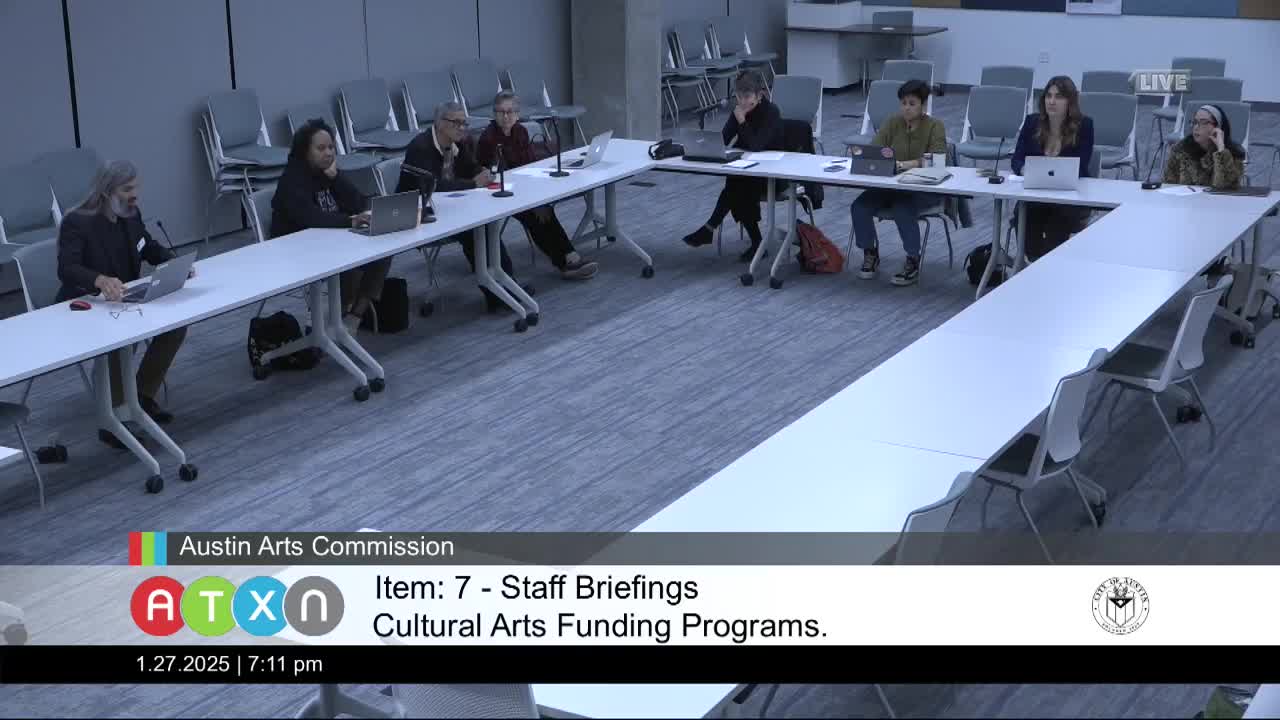Austin Arts Commission hears Measure evaluation as Nexus grant shifts to single annual cycle
Get AI-powered insights, summaries, and transcripts
Subscribe
Summary
City funding staff told the Austin Arts Commission that Nexus is moving to an annual, multiple-choice application with $5,000 awards and announced a Jan. 28–March 6 application window; an independent Measure evaluation urged simpler applications, standardized technical assistance and stronger community advisory roles.
Commissioners at the Austin Arts Commission meeting on Jan. 27 received combined briefings and analysis on the city’s cultural arts funding programs, the forthcoming Nexus grant round and an independent evaluation of Hotel Occupancy Tax-funded cultural programs from research nonprofit Measure.
City staff said Nexus will move from a biannual to an annual cycle, that the application will use multiple-choice scoring instead of long narrative questions, and that Nexus awards will be nominally $5,000 each. Jesus Pantel, cultural funding supervisor with the City of Austin’s Economic Development Department (EDD), said the Nexus application opens Jan. 28 and closes March 6; awarded activities may occur between May 1 and April 30 of the contract year, and final reports are due no later than May 30.
Measure, a local research and data-advocacy nonprofit, presented results of a mixed-methods evaluation of programs supported by the city’s Hotel Occupancy Tax (HOT). The Measure team said its quantitative analysis and eight qualitative focus groups (31 participants) indicate areas for improvement in application accessibility and in how the city documents program impact. Measure recommended simplifying applications, expanding and standardizing technical assistance, creating community advisory panels, collecting consistent multi-year data and adopting broader “community impact” metrics (testimonials, videos and narrative reports) alongside attendance and financial measures.
Commissioners pushed back strongly on parts of the Nexus rollout and on communication with staff. Commissioners said they had not been consulted on several substantive changes, called for earlier and deeper commission involvement, and asked staff to preserve pathways that help smaller or emerging artists.
Key points raised by commissioners and Measure
- Technical assistance gap: Measure’s analysis found a statistically significant correlation between receiving technical assistance and higher award rates. Commissioners said that the need for one-on-one help indicates the application itself remains a barrier for many applicants, and urged staff to standardize or require technical assistance so outcomes do not depend on who can access help.
- Scoring concerns: Commissioners questioned scored items that use percent of income from creative practice or ZIP-code proxies for affordability. They warned these can reward applicants with different private wealth profiles or penalize artists who live in gentrifying neighborhoods.
- Amount and cadence: Several commissioners proposed awarding smaller grants more frequently for individual artists and reserving larger awards for organizations, to provide better scaffolding from early support toward sustainability.
- Third-party administration and subgranting: Commissioners discussed the role of the Long Center (currently a third-party administrator) and asked staff to explore community-led or regranting models that empower local organizations to administer microsupport to artists.
- Community advisory panels and equity: Measure recommended establishing community advisory panels (possibly with decision-making authority) and funding reparative initiatives aimed at historically underserved neighborhoods.
Staff responses and next steps
Jesus Pantel and Matthew Schmidt, acting cultural arts division manager, said the Nexus changes were informed by prior pilot rounds and by collaboration with other division staff (including Music Division). They detailed applicant support offerings: multiple in-person/online information sessions, an “Ask Me Anything” Q&A scheduled at Zepeda Library (Feb. 6) and computer-lab submission support at DeWitty Job Training Center. Staff said open office hours will run Tuesdays 10 a.m.–noon through March 10 and extended hours on the March 6 due date. Pantel confirmed scoring rubrics will be auto-calculated in the Submittable platform; to align with other auto-scored programs, staff will not release the rubric forms in full to applicants this round.
Justin Parsons (equity & inclusion coordinator, EDD) acknowledged receipt of Measure’s findings, said the department has already begun work on some recommendations, and volunteered to coordinate follow-up with the commission’s working group. Staff committed to sharing the full Measure report and to continuing discussions with the commission’s cultural funding working group; commissioners requested a clear timeline for incorporating their feedback.
Why it matters
Hotel Occupancy Tax-funded cultural programs are a primary source of public operating support for many Austin artists and small arts groups. Changes to application format, review, award size and outreach affect who can apply, who can win awards, and how long-term impacts are documented. Commissioners, staff and Measure all urged clearer goals and consistent data collection so the city can measure progress and align funding to stated equity objectives.
What was not decided
There was no formal vote on Nexus policy or on Measure’s recommendations at the Jan. 27 meeting. Staff moved forward with the announced Nexus launch schedule but agreed to return with follow-up materials and to coordinate with the commission’s working group. Commissioners requested a written plan for how commission feedback will be incorporated into future rounds.
Ending note
Measure emphasized that the city’s programs already show promising indicators but that multiyear data and clearer impact metrics will be needed to track progress. Commissioners asked staff for an explicit, written timeline showing when the commission’s practical feedback will be reviewed and acted on.
